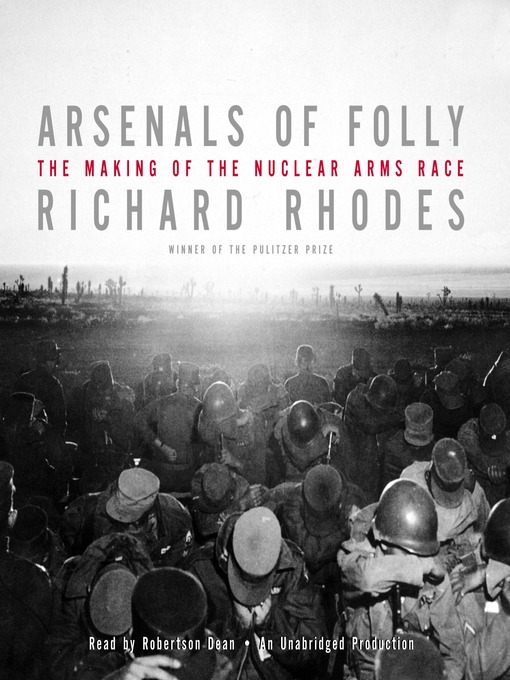In a narrative that moves like a thriller, Rhodes sheds light on the Reagan administration’s unprecedented arms buildup in the early 1980s, as well as the arms-reduction campaign that followed, and Reagan’s famous 1986 summit meeting with Gorbachev. Rhodes’s detailed exploration of events of this time constitutes a prehistory of the neoconservatives, demonstrating that the manipulation of government and public opinion with fake intelligence and threat inflation that the administration of George W. Bush has used to justify the current “war on terror” and the disastrous invasion of Iraq were developed and applied in the Reagan era and even before.
Drawing on personal interviews with both Soviet and U.S. participants, and on a wealth of new documentation, memoir literature, and oral history that has become available only in the past ten years, Rhodes recounts what actually happened in the final years of the Cold War that led to its dramatic end. The story is new, compelling, and continually surprising–a revelatory re-creation of a hugely important era of our recent history.
-
Creators
-
Publisher
-
Release date
October 9, 2007 -
Formats
-
OverDrive Listen audiobook
- ISBN: 9781415943311
- File size: 409200 KB
- Duration: 14:12:29
-
-
Languages
- English
-
Reviews
-
AudioFile Magazine
To capture the listener's attention, the story starts with the horror of the 1986 meltdown of the Russian nuclear reactor at Chernobyl. The author then segues into a biography of Mikhail Gorbachev and, finally, into a detailed description of the Cold War and the mutual buildup of U.S. and Russian nuclear weapons. Robertson Dean's precise diction and unhurried pace make for a comfortable listening experience. His deep, booming voice and resonating tone create an aura of mushroom clouds and nuclear winter as he recounts events that brought the world close to war during the 1962 Cuban Missile Crisis and the 1983 Russian shoot-down of a Korean airliner. While the audiobook is filled with tedious detail, this strong narrator will keep any drowsy listeners alert. J.A.H. (c) AudioFile 2008, Portland, Maine -
Publisher's Weekly
October 1, 2007
This is the third volume in a history of nuclear weaponry that began with the award-winningThe Making of the Atomic Bomb , but despite its subtitle, this installment might also be described as a chronicle of the unmaking of the arms race. Paralleling the careers of Mikhail Gorbachev and Ronald Reagan, Rhodes builds up to a detailed account of the 1986 Reykjavik summit, at which the two leaders-both eager to achieve peace-nearly came to an agreement on eliminating their nuclear arsenals, before the accord, he says, was sabotaged by then-assistant secretary of defense Richard Perle. The insistence of Perle and other advisers that the U.S. required a strong deterrent against the Soviet Union is held up for particular contempt. "There has never been a realistic military justification for accumulating large, expensive stockpiles of nuclear arms," Rhodes argues. Far from keeping America strong, decades of nuclear arms production have seriously eroded the nation's domestic infrastructure and diminished its citizens' quality of life, he believes. The clarity of the historical record reinforces Rhodes's fiercely held political convictions, ensuring widespread attention as he returns to this critically and commercially successful subject. -
Publisher's Weekly
August 13, 2007
This is the third volume in a history of nuclear weaponry that began with the award-winning The Making of the Atomic Bomb
, but despite its subtitle, this installment might also be described as a chronicle of the unmaking of the arms race. Paralleling the careers of Mikhail Gorbachev and Ronald Reagan, Rhodes builds up to a detailed account of the 1986 Reykjavik summit, at which the two leaders—both eager to achieve peace—nearly came to an agreement on eliminating their nuclear arsenals, before the accord, he says, was sabotaged by then-assistant secretary of defense Richard Perle. The insistence of Perle and other advisers that the U.S. required a strong deterrent against the Soviet Union is held up for particular contempt. “There has never been a realistic military justification for accumulating large, expensive stockpiles of nuclear arms,” Rhodes argues. Far from keeping America strong, decades of nuclear arms production have seriously eroded the nation's domestic infrastructure and diminished its citizens' quality of life, he believes. The clarity of the historical record reinforces Rhodes's fiercely held political convictions, ensuring widespread attention as he returns to this critically and commercially successful subject.
-
Loading
Why is availability limited?
×Availability can change throughout the month based on the library's budget. You can still place a hold on the title, and your hold will be automatically filled as soon as the title is available again.
The Kindle Book format for this title is not supported on:
×Read-along ebook
×The OverDrive Read format of this ebook has professional narration that plays while you read in your browser. Learn more here.


